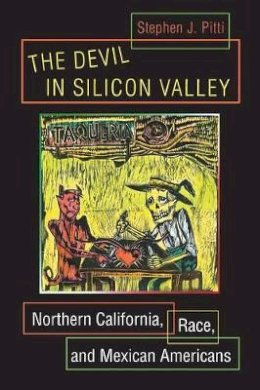
Stock image for illustration purposes only - book cover, edition or condition may vary.
The Devil in Silicon Valley: Northern California, Race, and Mexican Americans
Stephen J. Pitti
€ 69.35
FREE Delivery in Ireland
Description for The Devil in Silicon Valley: Northern California, Race, and Mexican Americans
Paperback. Explores the Latino presence in the United States. This book also debunks common myths about Silicon Valley. Based on oral histories as well as archival research, it shows how San Jose, Santa Clara, and other northern California locales played a critical role in the ongoing development of Latino politics. Num Pages: 320 pages, 26 halftones. 9 tables. BIC Classification: 1KBBWF; HBJK; HBLL; HBLW; HBTB. Category: (P) Professional & Vocational; (U) Tertiary Education (US: College). Dimension: 236 x 155 x 21. Weight in Grams: 460.
This sweeping history explores the growing Latino presence in the United States over the past two hundred years. It also debunks common myths about Silicon Valley, one of the world's most influential but least-understood places. Far more than any label of the moment, the devil of racism has long been Silicon Valley's defining force, and Stephen Pitti argues that ethnic Mexicans--rather than computer programmers--should take center stage in any contemporary discussion of the "new West." Pitti weaves together the experiences of disparate residents--early Spanish-Mexican settlers, Gold Rush miners, farmworkers transplanted from Texas, Chicano movement activists, and late-twentieth-century musicians--to offer a broad reevaluation of the American West. Based on dozens of oral histories as well as unprecedented archival research, The Devil in Silicon Valley shows how San Jose, Santa Clara, and other northern California locales played a critical role in the ongoing development of Latino politics. This is a transnational history. In addition to considering the past efforts of immigrant and U.S.-born miners, fruit cannery workers, and janitors at high-tech firms--many of whom retained strong ties to Mexico--Pitti describes the work of such well-known Valley residents as Cesar Chavez. He also chronicles the violent opposition ethnic Mexicans have faced in Santa Clara Valley. In the process, he reinterprets not only California history but the Latino political tradition and the story of American labor. This book follows California race relations from the Franciscan missions to the Gold Rush, from the New Almaden mine standoff to the Apple janitorial strike. As the first sustained account of Northern California's Mexican American history, it challenges conventional thinking and tells a fascinating story. Bringing the past to bear on the present, The Devil in Silicon Valley is counter-history at its best.
Product Details
Format
Paperback
Publication date
2004
Publisher
Princeton University Press New Jersey
Number of pages
320
Condition
New
Number of Pages
320
Place of Publication
New Jersey, United States
ISBN
9780691118468
SKU
V9780691118468
Shipping Time
Usually ships in 7 to 11 working days
Ref
99-1
About Stephen J. Pitti
Stephen J. Pitti is Assistant Professor of History and American Studies at Yale University.
Reviews for The Devil in Silicon Valley: Northern California, Race, and Mexican Americans
"Pitti is a scholar with an eye for the telling detail and a passion for social justice that turns his monograph into both a saga and a manifesto."
Jonathan Kirsch, Los Angeles Times Book Review "Pitti's book ... serves to correct a Mexican American historiography that has focused almost exclusively on southern California. Pitti argues that northern California has been too dynamic economically to be ignored by historians of ethnic minorities. His analysis focuses on the entwining of economic development, racism, and the formation of racialized Mexican communities over two centuries."
Donna R. Gabaccia, American Historical Review
Jonathan Kirsch, Los Angeles Times Book Review "Pitti's book ... serves to correct a Mexican American historiography that has focused almost exclusively on southern California. Pitti argues that northern California has been too dynamic economically to be ignored by historians of ethnic minorities. His analysis focuses on the entwining of economic development, racism, and the formation of racialized Mexican communities over two centuries."
Donna R. Gabaccia, American Historical Review
